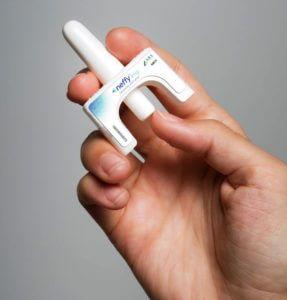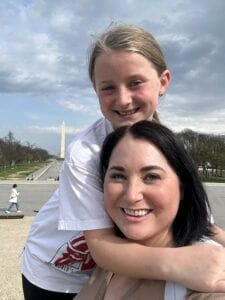The U.S. Food and Drug Administration has declined to approve a novel epinephrine nasal spray to treat allergic reactions. Instead, the health regulator told the manufacturer ARS Pharma that more study is first required in patients with nasal congestion.
It was a surprise decision since approval of the epinephrine nasal spray – called “neffy” – was widely anticipated. In May 2023, an independent committee of 22 experts voted to recommend that the FDA approve the epinephrine spray. (The FDA only goes against one-fifth of such committee recommendations in drug approvals.)

In its September 19, 2023 letter, the FDA says it requires ARS Pharma to conduct a clinical trial on the effectiveness of dosing neffy twice in patients congested because of allergic rhinitis. That data needs to be compared against repeat dosing in rhinitis patients who use an epinephrine auto-injector.
ARS Pharma said it had already agreed with the FDA to undertake a repeat-dosing study – but after approval. Now, the FDA wants the results before an approval decision. The company will appeal the FDA’s decision letter.
“We are very surprised by this action and the late requirement at this time to change the repeat-dose study from a post-marketing requirement, which we had previously aligned on with FDA, to a pre-approval requirement,” said Richard Lowenthal, ARS Pharma president and CEO.
He referenced the positive expert committee vote, and in a statement noted a “tremendous outpouring of support from the patient, advocacy, and physician communities” for a needle-free epinephrine device.
ARS Pharma hopes to resubmit an approval application to the FDA by the first half of 2024. “We aim to complete the newly requested trial as quickly as possible to meet the needs of patients,” Lowenthal said.
Why Expert Panel Supported Neffy
In May 2023, the 22-member FDA advisory committee considered data on ARS’s 2-milligram epinephrine spray for adults and children weighing 66 pounds or more. The committee voted 16 to 6 to recommend that the FDA approve the nasal spray for adults, and 17 to 5 to recommend it for children.
The committee first weighed the results of clinical trials that compared neffy to other epinephrine products, including EpiPens and epinephrine given by manually by syringe.
Those trials found that on heart rate and blood pressure effects, neffy fell within the range of other approved epinephrine products. The trials also measured peak concentration of epinephrine in the blood, and how long it takes to reach the peak.
There were some differences. For example, one trial in healthy adults found that after a dose of neffy, it took 30 minutes to reach peak concentration in the blood. EpiPen was faster, at 7.5 minutes, while manual injection took 45 minutes. The study also found that EpiPen resulted in the highest peak concentration, followed by neffy, then manual injection.
One trial did test how well neffy performed when people had stuffy noses. That study found absorption was in fact quicker when people had nasal congestion (only 6 minutes to maximum concentration). However, the peak epinephrine concentration was lower than in a control group with clear nasal passages.
Neffy trials, as with other epinephrine products, are conducted in healthy volunteers, not during anaphylactic reactions. This is for safety and ethical reasons. But the lack of real-world data did lead a few committee experts to recommend against approval.
In June, rival EpiPen marketer Viatris Inc. filed a “Citizen Petition” with the FDA that called for further study of neffy before approval.
Epinephrine and Unmet Needs
Getting epinephrine promptly in a progressing allergic reaction is considered vital to prevent life-threatening anaphylaxis. Yet, studies show that a fear of needles often prevents people with food and other allergies from using auto-injectors.
If ultimately approved, “we think neffy will make it more likely that people will people will dose right away and not wait until symptoms progress to a more severe state,” Lowenthal says.
Before the expert committee hearing in May, the FDA received over 600 public comments, mostly calling for an alternative to epinephrine auto-injectors. During the meeting, food allergy families spoke emotionally about the anxiety of repeatedly having to use an auto-injector.
One committee expert, Dr. Paul Greenberger, said before the vote that the data “do indeed support a favorable benefit-risk assessment. Let’s keep focused on the huge unmet need,” said the emeritus professor in the division of allergy and immunology at Northwestern University’s Feinberg School of Medicine.
“Anything to get epinephrine into people, effectively and faster, the better,” he said.
Amanda Bee of Provo, Utah, was among those who spoke before the experts. Her 11-year-old, Vivian, has repeatedly had an epinephrine auto-injector to treat allergic reactions to milk. The girl has become so fearful of needles that her parents have to hold her down to administer one.
Community’s Eyes on Neffy
“Disappointment hit hard when I heard it wasn’t approved,” says Bee. “Heartache took its place when I shared the news with my daughter.”

Vivian had been telling friends about the new epinephrine sprayer, “and that next time she goes into anaphylaxis she won’t have to be as scared.” Bee adds that “the food allergy community needs a needle-free epinephrine device, and we still have hope this will be approved.”
Particularly for those who fear needles, “this would be a game-changer,” says pediatrician Dr. Ruchi Gupta. The director of the Center for Food Allergy & Asthma Research at Northwestern University in Chicago, Gupta has a daughter with peanut and tree nut allergies. She is watching the development of epinephrine alternatives closely as a physician and a parent. “Having a choice in different administration techniques for epinephrine is really important,” she says.
While expressing “deep disappointment” with the FDA’s decision, Lowenthal said ARS will move forward swiftly with the new rhinitis study.
The neffy epinephrine spray uses Intravail, a proprietary solution that’s also used in other intranasal drugs. The CEO says it enhances absorption without causing irritation. In the neffy epinephrine sprayer, “we get injection-like absorption, without any pain or irritation to the nasal mucosa,” Lowenthal says. “And it does not affect smell or taste.”
While neffy is the first needle-free, epinephrine auto-injector alternative the FDA is considering, others are in the pipeline. The FDA also granted fast-track status to a sublingual (under the tongue) epinephrine film being developed by Aquestive Therapeutics. A second nasal spray, called Utuly, was also fast-tracked, and is being developed by Bryn Pharma.
Related Reading:
Expert Panel Recommends FDA Approve Neffy Epinephrine Spray
All About Epi: What It Does, When to Use, When to Give 2nd Dose





